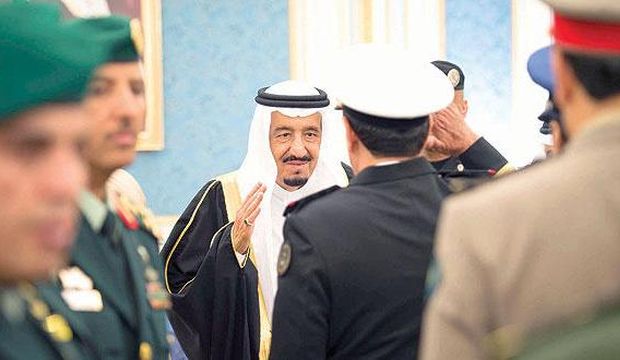
Saudi Arabia’s King Salman Bin Abdulaziz (C) greets members of the Saudi military at the Yamama Palace in Riyadh, Saudi Arabia, prior to his televised address to the nation, on March 10, 2015. (Asharq Al-Awsat/Bandar Galoud)
Riyadh and Al-Khobar, Asharq Al-Awsat—In his first major speech since becoming King of Saudi Arabia, Custodian of the Two Holy Mosques King Salman Bin Abdulaziz pledged to help mitigate the impact of plunging oil prices on the Kingdom’s economy and promote stability across the region.
In a televised speech given at the Yamama Palace in Riyadh on Tuesday, King Salman said that current oil prices, which have seen the price of global benchmark Brent crude lose around 60 percent of its value since mid-2014, were “having an effect on the Kingdom’s income.”
However, King Salman pledged that Saudi Arabia would continue looking for new deposits of oil, gas and other natural resources, stressing that the high prices seen in the oil market prior to the recent plunge had had a positive effect on the Kingdom’s economy and its ability to develop major economic projects.
He also stressed that in light of the current low oil prices the Kingdom needed to diversify its economy in order to reduce its reliance on hydrocarbons for its national income and create new jobs and opportunities for Saudi citizens.
The coming years would also require greater cooperation between the public and private sectors, King Salman said, with the Kingdom also eyeing growth in its small- and medium-sized enterprises.
“The next few years will be full of important accomplishments aimed at emphasizing the role of the industry and service sectors in the national economy,” the King said, adding that it was the “the joint responsibility of the public and private sectors to provide employment opportunities for citizens.”
Speaking to Asharq Al-Awsat, John Sfakianakis, the Middle East director of emerging markets investor the Ashmore Group, said the King’s speech was “pragmatic and realistic” and a clear sign that Saudi Arabia’s oil policy would not be changing, even in light of the current prices.
The Kingdom, one of the world’s biggest oil producers, and OPEC have faced pressure to lower production in recent months in order to help drive up prices, but both have said they would be leaving output unchanged and would seek to maintain their market shares.
Sfakianakis said King Salman’s openness in speaking in front of Saudi citizens about the challenges the country faced due to the impact of the low oil prices showed his readiness to tackle problems and sent a reassuring message to Saudi citizens.
During the speech, the King also touched on the Kingdom’s foreign policy, pledging to continue promoting peace and stability throughout the region and to abide by “international charters and agreements.”
He added that the Kingdom rejected any interference in its internal affairs and would continue to “defend Arab and Islamic causes,” foremost among them the Palestinian cause.
The King also called for unity in the Arab and Islamic worlds in order to fight the threats currently facing the region, represented mainly by the spread of extremist groups throughout the Middle East.
Also present at the Yamama Palace during the King’s address were Crown Prince Muqrin Bin Abdulaziz, Deputy Crown Prince Muhammad Bin Naif, and Saudi Arabia’s Grand Mufti, Sheikh Abdulaziz Al Al-Sheikh.
Wael Mahdi contributed additional reporting from Al-Khobar.
